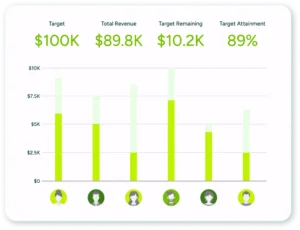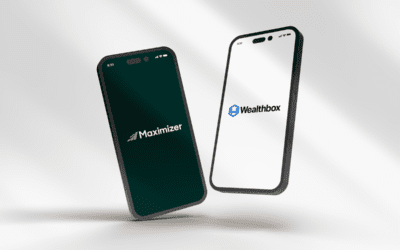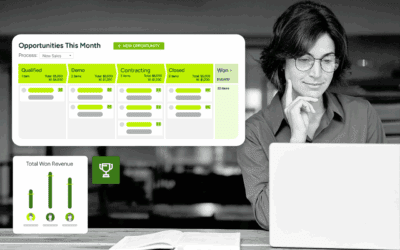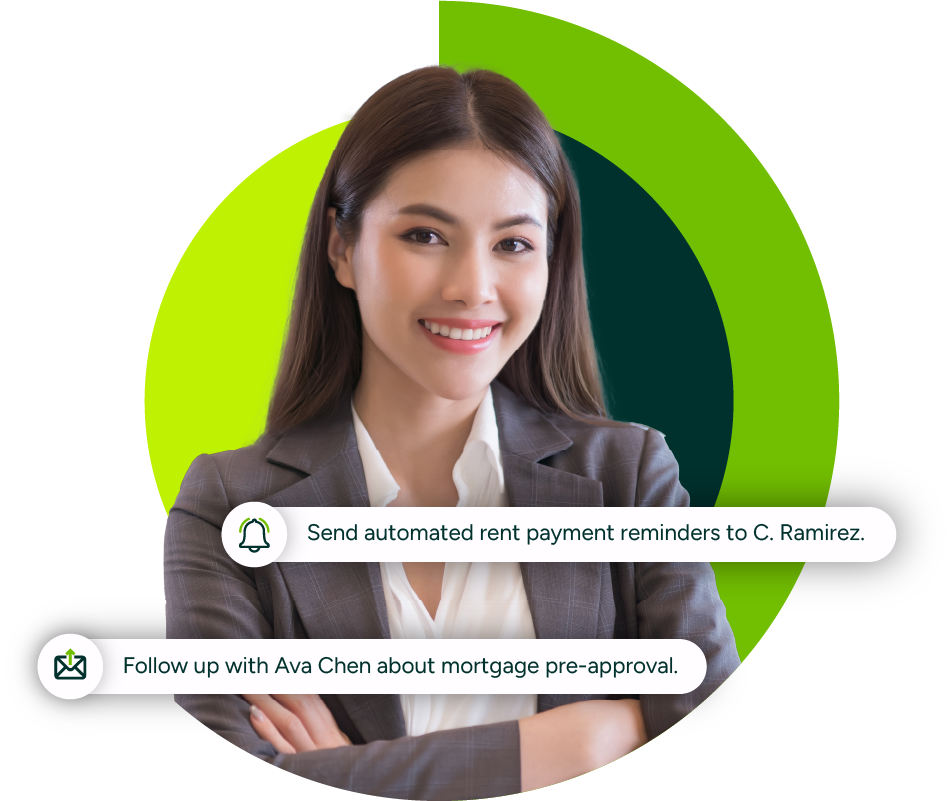
Trusted by 120,000 teams worldwide
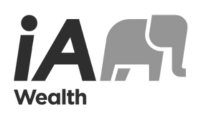

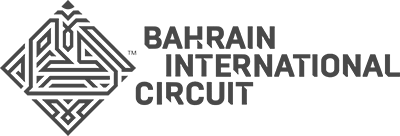

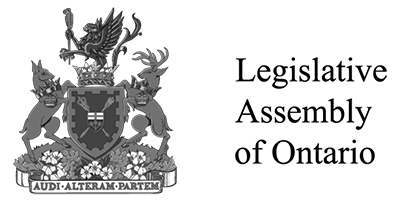

What is a property management CRM?
A property management CRM is a digital command center for landlords, leasing agents, and property managers. It centralizes tenant records, lease documents, and service requests, enabling better communication and faster response times. Think of it as your always-on assistant—organizing your daily tasks, alerting you to upcoming lease expirations, and making sure no tenant falls through the cracks.
The role of CRM in managing properties and tenants
From onboarding new tenants to sending lease renewal alerts, a property management CRM supports every stage of the tenant lifecycle. It helps you maintain a clean digital paper trail and ensures nothing gets lost between emails, spreadsheets, and voicemails.
How CRM simplifies lease and maintenance tracking
Lease agreements, rent schedules, maintenance logs—these details can quickly become a tangled mess. With CRM software for property managers, every document and deadline lives in one place, reducing missed tasks and boosting team accountability.
Unifying property operations with a CRM platform
No more juggling tools. A unified platform lets your team collaborate in real-time, track conversations, assign work orders, and follow up with tenants—all without switching apps.
Key features of a CRM for property management
Tenant communication and portal integration
A property management CRM acts as your centralized inbox and messaging hub. Send broadcast emails, track individual tenant communication histories, and integrate with tenant portals to manage conversations across channels. With communication logs tied directly to each tenant’s profile, your team always has the full context—no more digging through emails or post-it notes. Tenants can log in to update information, submit requests, or access lease documents, while you get alerts and a digital paper trail.
Lease management and renewal reminders
Stay ahead of lease expiration dates with customizable alerts and visual timelines. Property managers can easily manage complex lease terms, view historical agreements, and flag upcoming renewals for action. Attach supporting documents, notes, or payment plans directly to each lease. Some CRMs also support digital signatures and integrate with tools like DocuSign for frictionless contract workflows.
Maintenance request tracking and resolution
Receive and manage service requests from tenants, assign work orders to vendors, and track resolution times—all in one dashboard. With automation, you can assign recurring tasks (like HVAC inspections), receive updates when jobs are completed, and generate performance reports to ensure accountability. Plus, tenants can see real-time updates on request statuses, improving transparency.
Financial reporting and rent collection tools
CRMs for property management offer rent tracking dashboards, overdue payment notifications, and integration with accounting platforms to simplify billing and financial management. Quickly generate reports on rent collection rates, expenses, and profit margins. Some tools allow you to integrate rent collection with third-party payment platforms, helping you reconcile data without manual entry.
Mobile access for property managers
Whether you’re conducting site visits or meeting with tenants off-site, mobile CRM access is essential. Access tenant histories, update maintenance records, upload photos of unit conditions, and respond to service requests—all from your smartphone. Some CRMs also include offline capabilities so you can continue working without an internet connection and sync updates when back online.
Getting started on yourCRM Journey?
Discover how Maximizer’s property management CRM can give you the insights you need to grow. Book a demo today and turn your property operations into a competitive advantage.
Benefits of using CRM for property management
Improved tenant satisfaction and retention
Prompt responses and organized communication create a better tenant experience. With contact logs, automatic responses, and maintenance follow-ups, your CRM helps tenants feel seen and supported—boosting retention and reducing vacancy rates.
Efficient operations through automation
Replace repetitive tasks with automation rules that alert your team to upcoming lease deadlines, unpaid invoices, or incomplete maintenance jobs. Free up your staff for higher-value activities by removing the need for manual entry, duplication checks, or spreadsheet tracking.
Fewer errors in lease and payment tracking
A single system for lease management and rent collection reduces the risk of missing key dates or making costly errors. Centralizing this information ensures accuracy in tenant records, billing, and compliance documents.
Actionable insights for property performance
Dashboards let you monitor everything from rent collection percentages and occupancy rates to vendor response times and renewal success. Identify underperforming properties, track leasing trends, and adjust operations based on data—not assumptions.
Property management CRM for different needs
CRM for residential property managers
Track lease agreements, service requests, and communication history for every tenant in your residential portfolio.
Features for commercial property management
Monitor multi-unit tenants, custom lease terms, and long-term occupancy trends with a CRM that adapts to commercial complexity.
Managing single properties vs. large portfolios
Whether you manage one building or dozens, a CRM for rental properties gives you the flexibility to scale your operations with ease.
How to choose the right CRM for property management
Step 1: Identify your property and tenant needs
Start by listing your pain points: is communication falling through the cracks? Are leases or payments being missed? Are maintenance requests slow to resolve? Your CRM should solve the top 2–3 friction points in your day-to-day operations.
Step 2: Ensure integration with accounting and portals
Your CRM should work hand-in-hand with your existing tools—not replace them. Confirm it integrates with your accounting software, tenant portal, and maintenance systems. Look for tools that sync data across systems to avoid manual input or information silos.
Step 3: Look for automation and reporting features
Not all CRMs offer automation. Choose a platform that enables automated lease alerts, maintenance workflows, and follow-up reminders. Reporting dashboards should allow you to track key metrics like response times, rent collection, and lease expirations without needing a data analyst.
Step 4: Assess usability for your team
A powerful CRM is only valuable if your team uses it. Prioritize platforms with intuitive interfaces, mobile capabilities, and customizable dashboards. Ask about onboarding support, help centre resources, and whether the vendor provides industry-specific configurations.
Why Maximizer CRM is the best solution for property management
Custom tools for property managers
With Maximizer, property managers can create custom fields, tags, and workflows tailored to their leasing, maintenance, and tenant engagement processes.
Centralized tenant and lease management
All tenant interactions, documents, and lease timelines live in one accessible location—keeping your team informed and aligned.
Deep integration with property software
Maximizer connects with your existing platforms so you can manage finances, documents, and communications from a single interface.
Companies choose to partner with Maximizer
Learn why people love Maximizer
Maximizer CRM vs Wealthbox CRM: Financial Advisor CRM Comparison in Canada
In Canada, financial advisors face unique challenges: strict privacy laws, complex portfolios, and the need for detailed client reporting. Choosing the right CRM isn’t just about...
What is cross selling in CRM
Modern sales success depends on understanding customers well enough to anticipate their next needs. Cross selling in CRM focuses on using customer data to make relevant, timely product...
Best simple CRM software in 2026
What makes a CRM simple, user friendly, & efficient? A simple, user-friendly, and efficient CRM is designed to support how people work day-to-day. Instead of overwhelming users with complex...
Boost client satisfaction with AI CRM insights
Sign up for a free trial today and see how an Maximizer can boost your business.
Frequently asked questions
What is the best CRM for property management?
The best CRM offers customization, centralized operations, and integration with your existing tools. Maximizer stands out with its configurable dashboards, flexible automation, and robust tenant tracking capabilities, making it ideal for property managers handling multiple buildings or portfolios.
Can a CRM help with lease tracking and renewals?
Yes. CRM for property management can notify you of upcoming renewals, track critical dates, and store signed agreements in one centralized location—ensuring timely follow-up and fewer administrative headaches.
Is a CRM for property management useful for small landlords?
Absolutely. Whether you’re managing one building or ten, a CRM helps keep your data organized, your tenants happy, and your time focused.
How does a CRM handle maintenance requests?
Maintenance requests can be logged, assigned, and tracked within the system, providing a full history of service and resolution.
What features should I look for in a property management CRM?
Key features include communication tools, lease and document tracking, maintenance management, automation options, and reporting dashboards.
